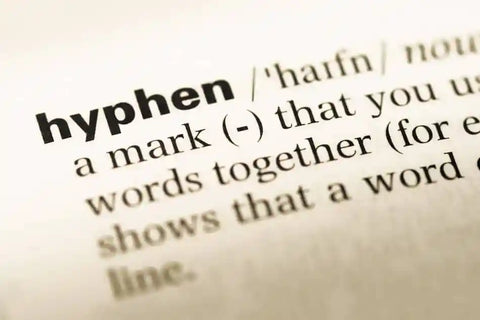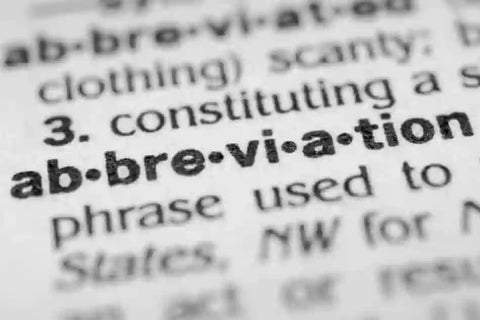Miscellaneous Uses of Hyphenation in the English Language
In my earlier posts on the use of hyphens, I discussed patterns for hyphenating compounds and adding prefixes and suffixes to words. In this post I would like to describe a number of miscellaneous uses of hyphens in the hope that these notes will help scholarly authors with a few of the smaller decisions required to prepare academic and scientific writing for publication.
• Hyphens are used when compound numbers are written out as words, as in ‘thirty-eight’ and ‘ninety-four.’ Although hyphens are often used between the numerals in number ranges, especially for page numbers (pp.21-46) and numerical references (1,4-7,10-13), this is not strictly correct, and en rules are the better choice (‘pp.21–46’ and ‘1,4–7, 10–13’). Only if the author guidelines provided by a publisher indicate that hyphens should be used instead of en rules should they be preferred. Hyphens should always be used instead of en rules to separate non-inclusive numbers such as ‘1-800-798-4672’ and other telephone numbers.
• A hyphen is used in the double-barrelled name of a single individual such as ‘Smith-Jones,’ but for compound nouns and adjectives derived from two names, an en rule is appropriate (the Mann–Whitney test). In adjectives of this sort, a hyphen can be (and often is) used instead of the en rule (Marxist-Leninist), and a hyphen should always be used when the first element cannot stand alone, as in ‘Sino-Japanese.’ When a compound is formed from names that are already double, it is essential that the distinct uses of the hyphen and the en rule be maintained: for example, ‘Johnson–Smith-Jones’ refers to two people, with the first named Johnson and the second named Smith-Jones, but if a hyphen were used instead of the en rule, as in ‘Johnson-Smith-Jones,’ or an en rule instead of the hyphen, as in ‘Johnson–Smith–Jones,’ confusion would ensue.
• Hyphenation is used for compass points in British English (‘north-west’ and ‘south-east’), but the same terms are closed in American English (‘northwest’ and ‘southeast’). However, when an additional element is added it is followed by a hyphen in both: ‘north-north-west’ in British English and ‘south-southeast’ in American. Hyphens are not used in the names of winds based on compass points, which generally appear as closed single words (a southwesterly), and they are also not used in capitalised compounds based on compass points, so ‘South East Asia,’ with the compound adjective open, is the form most often used in British English, and ‘Southeast Asia’ the dominant form in American English.
• A hyphen is used to indicate the omission of a common element when two or more similar compound terms appear close together, in which case the hyphen before the omitted element is followed by a space, as it is in ‘left- and right-handed’ or ‘upper- and lowercase.’ If the compounds are unclear or potentially ambiguous, however, each word should be written out in full, and the principle should definitely not be applied to the last in a sequence of such terms, which is to say that ‘uppercase and lower-’ is incorrect. The principle also does not apply when it is the first part of the compound terms that is shared, so ‘overindulged and -paid’ is incorrect and should be worded ‘overindulged and overpaid.’
• Hyphens are also used to separate letters when words are spelled out, as in information of this kind: ‘the town is called Kirkcudbright – that’s K-i-r-k-c-u-d-b-r-i-g-h-t’). Hyphens can also be used to indicate stammering or a pause in speech, as they are in ‘M-m-me? I’m t-t-terrified.’
• Hyphens often appear in universal resource locators (URLs), as they do in https://stagprs.wpenginepowered.com/, where it is essential that they not be confused with underlining (_) or the tilde grapheme (~).
Why Our Editing and Proofreading Services?
At Proof-Reading-Service.com we offer the highest quality journal article editing, dissertation proofreading and online proofreading services via our large and extremely dedicated team of academic and scientific professionals. All of our proofreaders are native speakers of English who have earned their own postgraduate degrees, and their areas of specialisation cover such a wide range of disciplines that we are able to help our international clientele with research editing to improve and perfect all kinds of academic manuscripts for successful publication. Many of the carefully trained members of our manuscript editing and proofreading team work predominantly on articles intended for publication in scholarly journals, applying painstaking journal editing standards to ensure that the references and formatting used in each paper are in conformity with the journal’s instructions for authors and to correct any grammar, spelling, punctuation or simple typing errors. In this way, we enable our clients to report their research in the clear and accurate ways required to impress acquisitions proofreaders and achieve publication.
Our scientific proofreading services for the authors of a wide variety of scientific journal papers are especially popular, but we also offer manuscript proofreading services and have the experience and expertise to proofread and edit manuscripts in all scholarly disciplines, as well as beyond them. We have team members who specialise in medical proofreading services, and some of our experts dedicate their time exclusively to dissertation proofreading and manuscript proofreading, offering academics the opportunity to improve their use of formatting and language through the most exacting PhD thesis editing and journal article proofreading practices. Whether you are preparing a conference paper for presentation, polishing a progress report to share with colleagues, or facing the daunting task of editing and perfecting any kind of scholarly document for publication, a qualified member of our professional team can provide invaluable assistance and give you greater confidence in your written work.
If you are in the process of preparing an article for an academic or scientific journal, or planning one for the near future, you may well be interested in a new book, Guide to Journal Publication, which is available on our Tips and Advice on Publishing Research in Journals website.








